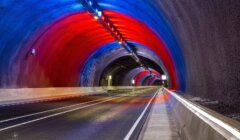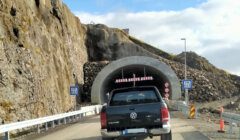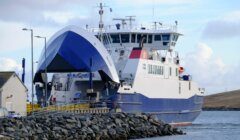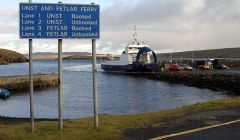Transport / ‘Are we crazy?’ Yell and Unst tunnel groups release report into Faroe visit
THE YELL and Unst tunnel action groups have now released a report following their recent fact-finding visit to Faroe – and it concludes that there would be a series of social and economic benefits from fixed links.
These include the growth of local communities, increased employment and leisure opportunities, housing development, improved capacity for the movement of goods like perishable foodstuffs and the environmental impact.
The report entitled Subsea Tunnels: Are We Crazy? explores how tunnels have impacted the Faroe Islands and provides comparisons between the two island groups in terms of geology, socio-economic and environmental factors, and issues relating to funding.
It comes as the two groups continue to fundraise for geo-technical, socio-economic and environmental investigations into possible tunnels to Yell and Unst.
The report tackled some “perceptions being voiced locally that tunnels will empty our islands of people and services, particularly shops and schools”.
The groups said that based on the experience in Faroe, tunnels appear to have led to population growth and a rebalancing of the age structure.
“This should help to increase demand for services and therefore assist with their retention,” the report said.
“We have already seen shops in our islands close in recent years without tunnels being in place. Most recently in Ulsta.
“Those that remain have adapted to changing circumstances within the market, such as residents shopping in Lerwick supermarkets. Ask yourself when you were last in Tesco or the Co-op and didn’t see someone from Unst or Yell? We believe that through increasing both the local population and visitors, tunnels may actually improve the sustainability of those that remain.
“Schools have also closed in our islands in recent years without tunnels being in place. Unst now has only one school, whilst Yell retains three. We believe that through increasing the number of pupils attending these schools, tunnels may actually help retain these services.”
Become a member of Shetland News
When it comes to the environmental impact of replacing ferries with tunnels, the report said: “Although future ferries may become more fuel efficient and a subsea tunnel is likely to result in increased vehicle traffic, over time this traffic is very likely to become more electrified.
“We therefore believe that, on balance, a tunnel will be the most environmentally sensitive transport solution for our islands.”
Joint chair of Unst Tunnel Action Group Alice Mathewson said: “The overwhelming message we received there was that if you are serious about a tunnel project, the first step must be to map the geology, which is the cornerstone of the work we intend to undertake.
“The geology of the Faroes differs from that of Shetland but the underlying principles of the work to be undertaken and data to be collected remain the same.
“We now intend to seek data that already exists: that commissioned by Shetland Islands Council, as well as the oil, renewables, and fisheries industries and service providers, including those laying subsea cables. This will help to inform our geological investigations.
“Our target during the initial phase of our fundraising is to undertake these investigations up to geotechnical cores. Should we achieve this, we will then move forward to seek funding for bore holes and horizontal drilling on both sounds.
“This should provide the necessary data for any potential developer to take the project forward.”
Joint chair of Yell Tunnel Action Group Steven Henderson said: “It is evident from the Faroese experience that the introduction of tunnels would provide opportunities for growth and development for our communities and the wider economy, as well as assist in our journey towards carbon neutrality. It will also help to rebalance the incessant centralisation of both services and population.
“Both the Faroese and Shetland economies have traditionally been highly dependent on fisheries. In Shetland there is a higher proportionate dependency on the seafood industry in Unst and Yell, accounting for a third of all employment and half of all male jobs.
“The importance to the economy of moving time-sensitive, perishable seafood cannot be overstated, yet it is reliant on a ferry service that can be restricted due to ferry timetabling and service suspension. This is a significant burden for businesses and service providers, limiting both economic activity and workforce mobility.
“Supporting, diversifying, and broadening our economic base is imperative for the survival and growth of our communities. Put simply, we wish to ensure the islands of Unst and Yell continue to be amazing places in which to live, work, visit, and invest, and we believe that a major way of achieving this is through permanent fixed transport links, ie tunnels.”
The action groups also found that the funding of subsea tunnels through public/private partnership, utilising both public investment and publicly sourced/guaranteed loans, financed by toll payments, works well in Faroe.
Joint chair of Yell Tunnel Action Group Graham Hughson said: “We have never suggested that tunnels to Unst and Yell should either be fully publicly funded nor toll free.
“We would like all potential funding routes to be explored, and we believe that the Faroese model is one that should be examined in more detail.”
Unst Tunnel Action Group joint chair Duncan Gray added: “Understandably, there can be a fear of the unknown from those who are not familiar with this type of project. We now need to foster the political will to explore and back a project with beneficial long-term outcomes.
“Ultimately it comes down to risk. The costs for tunnels currently being quoted within political circles in the UK are far beyond those quoted to us by Faroese and Norwegian tunnelling experts. We believe that a lot of the risk and uncertainty can be reduced through geological investigation.
“That is why we are centring our efforts on geological studies in order to get a better understanding and more realistic costing for tunnels to serve our islands.
“There is also no guarantee that the Scottish Government will continue to fund the deficit which they currently commit to our ferry service, nor is there any plan, realistic costing, or budget in place for ferry replacement.
“Even if these were to appear, our communities will face the same ongoing situation every 20 to 30 years. Therefore, on that basis alone, we believe that the option of constructing tunnels is forward thinking and economically sound.”
Funding of tunnels remains an unanswered question, but the report says in Faroe all four subsea tunnels – which are generally longer than Yell Sound and Bluemull Sound – have been funded through public/private partnership.
“This has included direct public funding which has varied from 59 per cent to 15 per cent,” it added.
Mathewson encouraged all to read the report, “particularly our decision makers”, and to take a trip to the Faroe Islands to see for themselves what can and has been achieved.
“The ‘Are we crazy?’ was inspired by a geologist we met in Faroe who said ‘Back in the 1980’s when we first started to speak about subsea tunnels, I thought we were crazy, but look what we’ve achieved’”, she said.
“We very much hope that we will soon be able to reflect back in a similar vein.”
Become a member of Shetland News
Shetland News is asking its many readers to consider paying for membership to get additional features and services: -
- Remove non-local ads;
- Bookmark posts to read later;
- Exclusive curated weekly newsletter;
- Hide membership messages;
- Comments open for discussion.
If you appreciate what we do and feel strongly about impartial local journalism, then please become a member of Shetland News by either making a single payment, or setting up a monthly, quarterly or yearly subscription.







































































